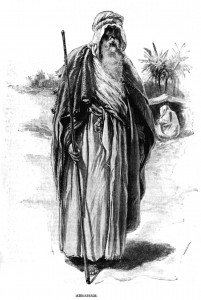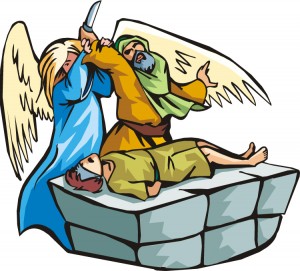Genesis 17:1, 22, YHVH appears to Abraham and establishes circumcision as a sign of the covenant.
And when Abram was ninety years old and nine, YHVH appeared [ra’ah meaning “to see, look, behold, show, appear, observe, have vision, present oneself, be seen”] to Abram, and said unto him, I am El Shaddai; walk before me, and be thou perfect.

YHVH proceeds to lay out to Abraham the terms of the Abrahamic Covenant including circumcision and the fact that Sarah would give birth to a son with whom YHVH would also establish his covenant. When YHVH was done Scripture records the following in verse 22,
And [YHVH] left off talking with him, and Elohim went up [alah, to go up, ascend, climb, depart] from Abraham. (KJV)
And when He had finished speaking with him, God ascended from upon Abraham. (The ArtScroll Stone Edition Tanach)
And He ceased speaking with him; and the Glory of the Lord ascended from Abraham. (Targum Jonathan)
And when He had ended to speak with him, the Glory of the Lord ascended up from Abraham. (Targum Onkelos)
And be left off speaking with him, and God went up from Abraham. (LXX)
This text does not state how YHVH appeared or spoke to Abraham, just the fact that he did. According to the Hebrew rules of biblical interpretation (and the rules of common logic when reading anything), a scriptural text is to be taken at its literal or plain (peshat) meaning, unless the text itself suggests an allegorical (drash) or mystical (sod) interpretation. The Talmud (the Jewish Oral Law) states this in Talmud b. Shabbath 63a ( … that a verse cannot depart from its plain meaning”) and Talmud b. Yevamoth 24a (“Although throughout the Torah no text loses its ordinary meaning …”). Therefore, it is evident that YHVH appeared to Abraham in some tangible form with which humans are capable of interacting. If he did so once, we have to ask, cannot he do it again in the Person of Yeshua of Nazareth, the Messiah?
Let’s note some reasons why YHVH chose circumcision to be the sign of the Abrahamic Covenant. Remember, physical circumcision is not passé, but is still a requirement for those desiring to be priests in YHVH’s future (spiritual?) temple (Ezek 44:7, 9):
- It is a token or sign of spiritual things—a sign that always goes before us. (Gen 17:11)
- It signifies purification of the heart from all unrighteousness by cutting away a piece of the flesh that would otherwise be a carrier of filth and disease.
- It is a holy seal of righteousness—the foreskin removed is round like a ring. A ring signifies a bond or union and is worn constantly even as the seal of circumcision is worn constantly.
- Circumcision occurs at eight days of age. Eight is the number meaning new beginnings. A new heart, a consecration of the person to YHVH; the commencement of a covenant. (Gen 17:12)
- The rite of circumcision is painful and humiliating. So is repentance and self denial of which circumcision is a picture.
- From the penis flows the seed of life. Circumcision is a sign that the seed should and could be righteous and consecrated to YHVH.
- In Romans 4:11, Paul teaches us that circumcision is a sign, mark or token, and a seal (placed on someone) or an impression or stamp made by a signet ring signifying ownership. Circumcision spoke of Abraham’s righteousness and the faith he had in YHVH and YHVH’s “ownership” of Abraham. A modern-day example of this would be the marriage ring. One can be legally married without wearing a ring; however, a wedding ring is an outward and visible sign of one’s marriage covenant. The same is true of circumcision. It’s not a salvational requirement, yet it’s an outward sign of an inward spiritual reality.
The Scriptures make it clear that circumcision is not a requirement for salvation (see Acts 15) or else women couldn’t be saved. Circumcision is, however, an act of obedience that indicates one’s identity with the Abrahamic Covenant model of salvation and with the people of Israel. Additionally, the Torah makes it clear that circumcision is required for all men who desire to take Passover, and those who do not keep the Passover will be cut off from Israel (Exod 12:47–48), although in the New Covenant, circumcision of the heart is now the chief requirement (Rom 2:25–29; Gal 6:15; Col 2:11).







